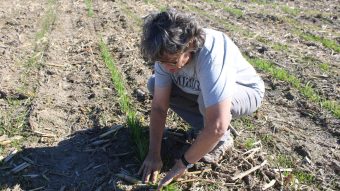
Nov. 15, 2023
On a cold, rainy March day in the chapel of the Moberly Correctional Center, staff members and prison residents perched on metal folding chairs surrounding three sides of a long table. PowerPoint slides splashed color on a nearby wall.
The disparate groups came together to discuss improving conditions in the prison, eventually adjourning with handshakes and returning to their respective routines.
It might not sound particularly memorable, but this cordial meeting was uncharted territory for everyone involved. Kelli Canada, an associate professor in the University of Missouri’s School of Social Work, said getting the two groups to work together toward a common goal is something that simply doesn’t happen in prisons. Canada is working with a team of researchers on the Prison Research and Innovation Network (PRIN) to make prisons safer and more rehabilitative.
“It can be really hard to make meaningful changes,” Canada said. “But our goal has always been to create a sustainable process where the staff and the incarcerated people have a voice and can talk with administrators about ideas they might have to solve ongoing concerns. We’ve done coaching on being solution-focused and not living in the past.”
Dana Cafourek, who coordinated PRIN for the Missouri Department of Corrections, noted the Moberly Correctional Center (MCC) was a natural choice for the project, as it was the first prison in the state to create a veteran’s dorm.
“They already had that mindset of change and understood how changing a culture can make things better for everyone involved,” Cafourek said.
The PRIN team pulled together an innovation advisory group of prison staff, incarcerated people and administrators to talk through some of the goals for the project. The group developed a brief survey to learn about the changes people wanted to see in the prison.
Using the responses, organizers worked to overhaul training and onboarding for prison staff. They also added a decompression space where staff members can go after traumatic events or before or after a shift.
“We wanted to create a space that was totally removed from the operational aspect of prison,” Cafourek said. “People said I was crazy for wanting to put massage chairs in a prison, but it was meant to be a space for them to come chill out for a minute when they need to decompress.”
For residents of the MCC, the PRIN efforts focused on getting fresh fruits and vegetables in the prison canteen, developing more programming on re-entry for people transitioning back to life outside of prison and creating opportunities for family contact within the institution.
Although the PRIN will wind down by the end of the year, there’s an appetite to continue several of the programs at the MCC and to extend those programs to other institutions.
There have been several positive outcomes from the programs. While it could stem from a variety of factors, the use of force at the Moberly site has decreased over time while overall morale is trending upward.
“The guys that are involved with any of the projects definitely feel heard and that they’ve contributed to something positive,” Cafourek said. “It’s been a nice boost to morale for everyone.”
Read more from the College of Health Sciences


